Unlocking the Power of Personalized Emails
Generic emails get lost. Personalized emails get results. This list of 10 best-in-class email personalization tools will help you connect with your audience on a deeper level, improving open rates, clicks, and conversions. Discover which email personalization tools are right for your business, whether you're a solopreneur or leading a large team. From simplifying basic personalization tasks to sophisticated AI-powered solutions, you'll find the perfect tool to elevate your email marketing.
1. OKZest
OKZest stands out among email personalization tools by focusing on a crucial yet often overlooked aspect: visual customization. While many tools personalize text, OKZest empowers you to create dynamic images that resonate with each recipient on a deeper level. Imagine sending emails where the banner image not only greets the recipient by name but also showcases products they've recently viewed or promotes an event in their local area. This level of visual personalization grabs attention, fosters a stronger connection, and ultimately drives conversions. OKZest is an excellent choice for anyone looking to elevate their email marketing with personalized visuals, making it a top contender in the realm of email personalization tools.
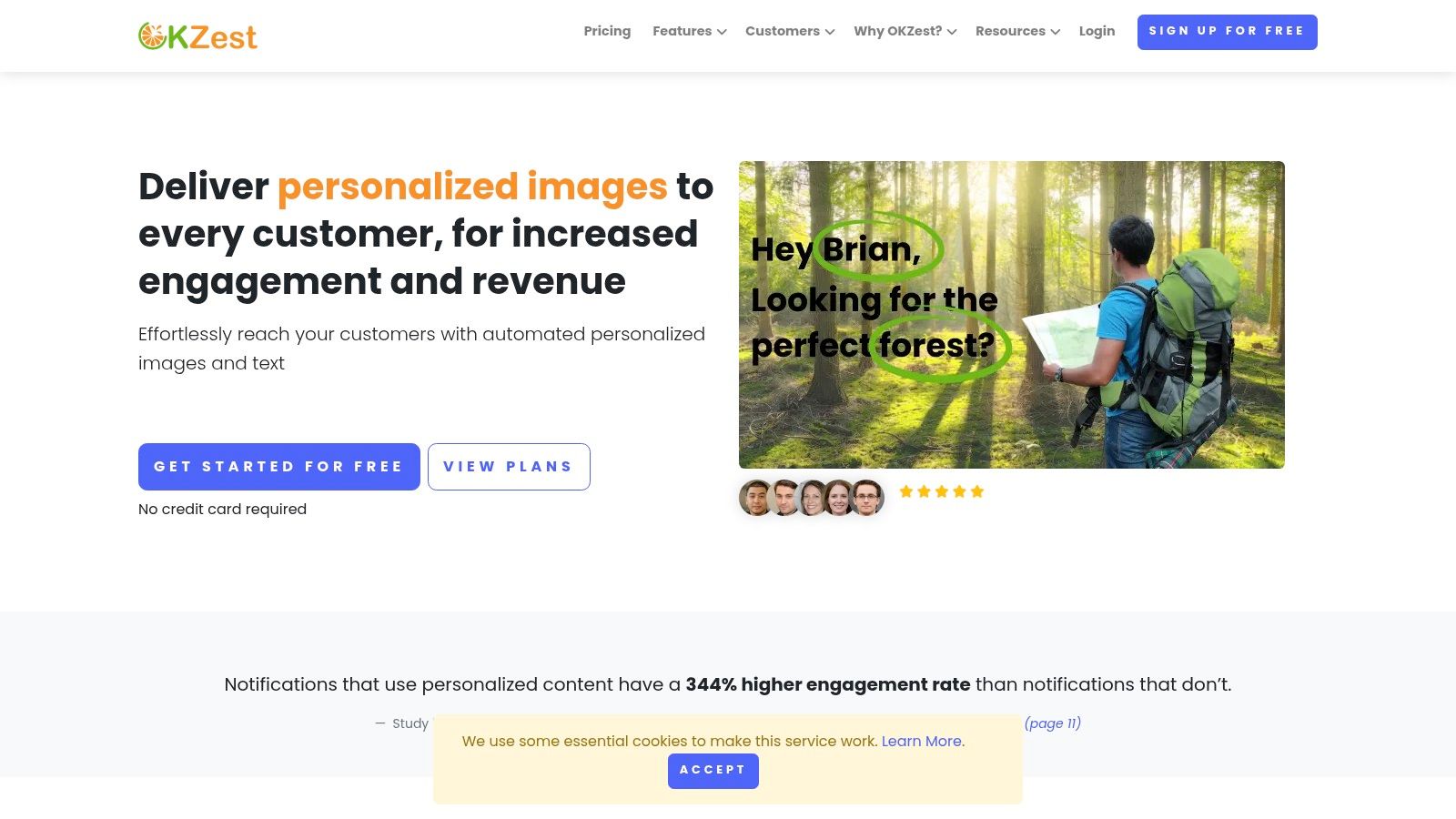
For email marketers, OKZest offers a powerful way to stand out in crowded inboxes. Instead of generic product images, you can showcase personalized recommendations based on past purchases or browsing history. Marketing agencies can leverage OKZest to create unique, branded visuals for each client, enhancing campaign performance and demonstrating value. Social media managers can extend their visual personalization efforts beyond static images, creating dynamic graphics for ads and organic posts. Event organizers can generate personalized tickets and promotional materials with attendee names and event details. Consultants and coaches can create personalized visuals for their clients, incorporating their names and brand elements into presentations and proposals. Sales teams can send personalized product demos and proposals with client-specific information, increasing engagement and closing rates. Even influencer marketers, real estate agents, and recruiters can leverage the power of personalized images to build stronger relationships and drive results.
OKZest offers both no-code and API solutions, catering to users of varying technical abilities. The no-code option allows you to easily create personalized images using a drag-and-drop interface, while the API provides greater flexibility for developers to integrate OKZest into existing workflows. The platform integrates seamlessly with 99% of Email Service Providers (ESPs) like Mailchimp, Instantly, and Klaviyo, eliminating compatibility concerns. It supports dynamic content, pulling real-time data from multiple sources to ensure your images are always up-to-date. Fallback text options are available to handle situations where personalized data is missing. Robust team collaboration features, including customizable roles and project management tools, make OKZest ideal for teams of all sizes.
Pricing: OKZest offers scalable pricing plans ranging from a free option to enterprise-level solutions capable of handling millions of images per month, allowing businesses of any size to benefit from personalized visuals.
Pros:
- Automates image personalization with no-code and API options.
- Seamless integration with most ESPs.
- Scalable pricing to fit any budget.
- Dynamic content support for real-time personalization.
- Robust team collaboration features.
Cons:
- Advanced dynamic data integrations may require a learning curve.
- Some features might demand technical expertise for full utilization.
Implementation Tip: Start with simple personalization, like adding names and company logos, and gradually explore more advanced dynamic content integrations as you become familiar with the platform.
Website: https://okzest.com
2. Mailchimp
Mailchimp is a well-regarded email personalization tool and a comprehensive email marketing platform offering robust personalization capabilities. It empowers businesses to craft targeted campaigns based on valuable customer data, observed behavior, and stated preferences. Through its user-friendly interface, even beginners can easily segment their audience and deliver personalized content that resonates with specific groups. Mailchimp's personalization goes beyond simply adding names to emails; it enables dynamic content blocks, personalized product recommendations, and behavior-based automation workflows, making it a powerful tool for email marketers aiming to boost engagement and conversions. This positions Mailchimp as an excellent option for a wide range of users, from small businesses using the free tier to larger enterprises leveraging its advanced features.
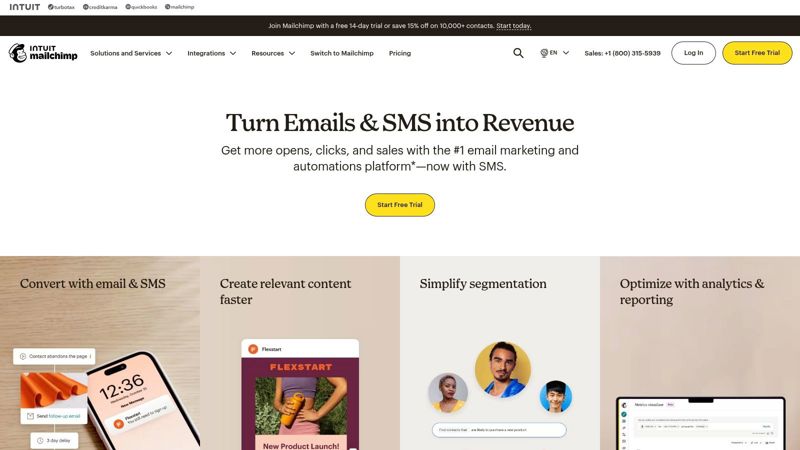
For instance, an e-commerce business can use Mailchimp to send personalized product recommendations based on past purchases. A real estate agent could segment their audience by property type preferences and send targeted listings. Event organizers can tailor their email communications based on attendee registration details and past event attendance. Consultants and coaches can automate personalized follow-up sequences based on client interactions. Learn more about Mailchimp and its best practices to maximize your email marketing efforts.
Features:
- Dynamic Content Blocks: Tailor content within emails based on individual recipient data, like showing specific promotions to certain demographics.
- Behavior-Based Automation Sequences: Trigger automated email series based on subscriber actions, such as website visits, abandoned carts, or email opens.
- Advanced Segmentation Capabilities: Divide your audience into highly targeted segments based on demographics, purchase history, engagement, and more.
- AI-Powered Content Recommendations: Leverage AI to suggest relevant content and products to include in your personalized emails.
- Personalized Send Times: Optimize email delivery timing based on individual engagement history to maximize open rates.
Pros:
- User-Friendly Interface: Easy to navigate and use, even for beginners with limited email marketing experience.
- Comprehensive Analytics: Track and measure the effectiveness of your personalization efforts with detailed reports.
- Robust Free Tier: Offers a generous free plan for smaller businesses and those just starting out with email marketing.
- Integrations: Connects with numerous third-party platforms, expanding its functionality and data utilization.
Cons:
- Pricing: Can become expensive as your subscriber list grows, requiring an upgrade to a higher-tier plan.
- Advanced Features & Higher Tiers: Accessing the most powerful personalization features often necessitates subscribing to the more expensive plans.
- Email Template Customization: While offering flexibility, template customization can sometimes be limiting for highly complex designs.
Website: https://www.mailchimp.com/
Mailchimp deserves its place on this list because it offers a balanced combination of user-friendliness, powerful features, and affordability, especially for businesses getting started with email personalization. While advanced features come at a cost, the platform's robust free tier and intuitive interface make it accessible to a broad range of users, including email marketers, marketing agencies, social media managers, event organizers, consultants, sales teams, influencer marketers, real estate agents, and recruiters. Its wide array of integrations further solidifies its position as a versatile and valuable email personalization tool.
3. HubSpot Email Marketing
HubSpot Email Marketing isn't just another email personalization tool; it's a powerhouse fueled by the depth of HubSpot's CRM. This makes it ideal for businesses serious about leveraging data to create dynamic and deeply personalized email experiences. Unlike standalone tools that might offer basic personalization, HubSpot goes further by enabling you to utilize virtually any contact property stored in your CRM. Imagine sending an email that addresses a customer by name, mentions their recent purchase, and offers a relevant upsell based on their past browsing history – all automatically. That’s the level of granular personalization HubSpot unlocks. This comprehensive approach is why it deserves a spot on this list of top email personalization tools.
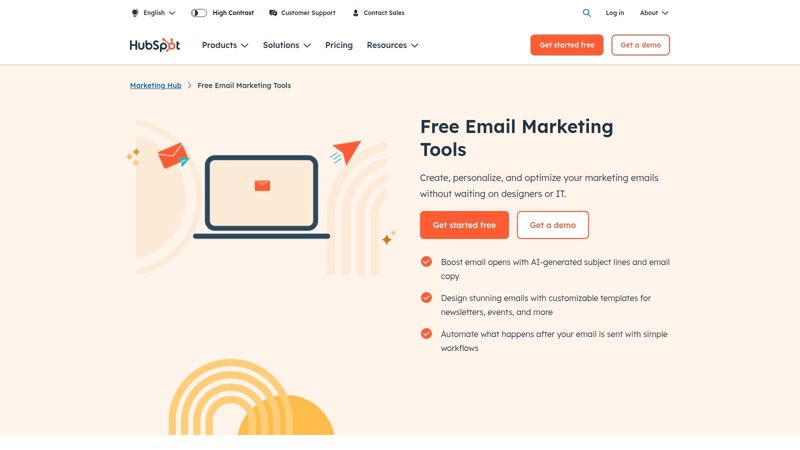
One of HubSpot's most powerful personalization features is its "smart content" functionality. This allows marketers to tailor content blocks within emails based on recipient criteria. For instance, you can display different product recommendations to leads versus existing customers, showcase specific case studies based on industry, or alter the tone and messaging based on lifecycle stage. This dynamic adaptation ensures every email resonates with the individual recipient, maximizing engagement and conversions. For example, a real estate agent could use smart content to show first-time homebuyers information about mortgages, while presenting seasoned investors with properties matching their investment criteria. Similarly, recruiters could tailor job postings based on a candidate's experience level.
HubSpot’s personalization capabilities extend beyond individual emails to automated workflows. Based on user behavior, such as website visits, content downloads, or email clicks, you can trigger personalized email sequences that nurture leads and guide them through the sales funnel. This behavioral targeting allows for highly relevant follow-up communication, boosting conversion rates and fostering stronger customer relationships. For example, if a lead downloads a whitepaper on "Social Media Marketing for Beginners," an automated workflow could trigger a series of emails offering further resources and eventually introducing social media management services.
Features:
- CRM-powered personalization using any contact property
- Smart content blocks that display differently based on recipient criteria
- A/B testing to optimize personalization strategies
- Personalized automation workflows based on user behavior
- Real-time personalization reporting
Pros:
- Deep integration with HubSpot CRM for comprehensive personalization
- Intuitive drag-and-drop email builder
- Excellent customer support and resources
- Part of a comprehensive marketing platform
Cons:
- Higher price point compared to standalone email tools (Marketing Hub starts at $450/month)
- Full personalization capabilities require investment in the broader HubSpot ecosystem
- Steeper learning curve for utilizing all personalization features
Implementation Tips:
- Start by mapping out your customer data and identifying key properties for personalization.
- Utilize HubSpot's segmentation tools to create targeted lists based on shared characteristics.
- Experiment with smart content to tailor your messaging to different audience segments.
- Leverage A/B testing to continuously refine your personalization strategies.
- Integrate HubSpot with other marketing tools to create a seamless and personalized customer journey.
Comparison: While tools like Mailchimp and ActiveCampaign offer personalization features, HubSpot's tight integration with its CRM provides a more holistic and powerful approach. This makes it particularly suitable for businesses already invested in the HubSpot ecosystem or those seeking deep personalization capabilities.
Website: https://www.hubspot.com/products/marketing/email
HubSpot Email Marketing offers a robust solution for email personalization, going beyond simple name insertions to deliver truly dynamic and tailored experiences. While the investment might be higher than standalone tools, the depth of personalization, combined with the power of the HubSpot ecosystem, makes it a valuable asset for businesses looking to maximize their email marketing ROI.
4. Klaviyo
Klaviyo is a robust email personalization tool specifically designed to empower e-commerce businesses. More than just a basic email marketing platform, Klaviyo excels at creating highly personalized customer journeys driven by rich data insights. It automatically synchronizes crucial customer information directly from your online store, encompassing valuable details like past purchases, browsing behavior, and expressed product interests. This deep integration allows for the creation of laser-focused email campaigns, maximizing engagement and driving conversions. With Klaviyo, you're not just sending emails; you're building personalized experiences.
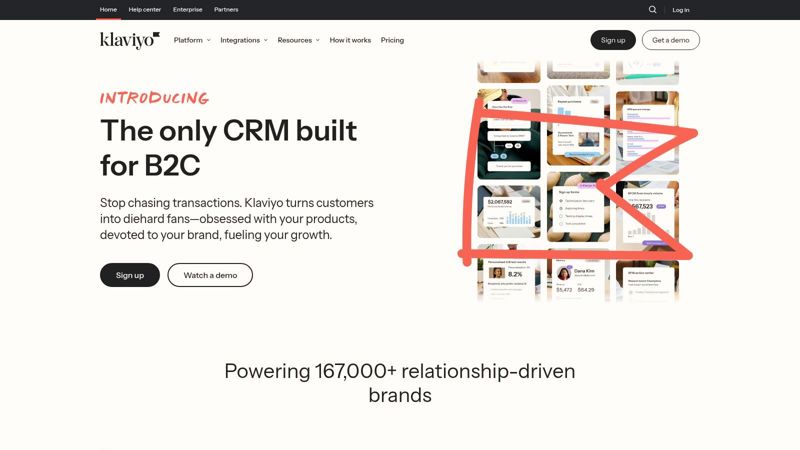
One of Klaviyo's standout features is its ability to generate dynamic product recommendations. Imagine a customer abandoning their cart with a specific pair of shoes. Klaviyo can automatically send a personalized email showcasing those exact shoes, along with other similar items they might be interested in, significantly increasing the chances of recovering the sale. Beyond abandoned cart recovery, Klaviyo allows for personalized post-purchase follow-ups, cross-selling complementary products, and even win-back campaigns for lapsed customers. Its predictive analytics go a step further, forecasting future customer interests to suggest products they haven't even considered yet. This personalized approach allows you to nurture customer relationships throughout their entire lifecycle. Learn more about Klaviyo and explore different automated workflow examples.
Klaviyo's strength lies in its deep e-commerce integrations, particularly with platforms like Shopify. This seamless integration allows for a unified view of customer data, creating rich profiles for truly personalized messaging. Powerful segmentation capabilities let you target specific customer segments based on a variety of factors, ensuring the right message reaches the right person at the right time. Furthermore, robust revenue attribution reporting allows you to track the effectiveness of your personalized email campaigns and measure their impact on your bottom line.
While Klaviyo offers immense power for email personalization, it's worth noting that its pricing is higher compared to more general email marketing tools. Its extensive feature set can also present a steeper learning curve, requiring some investment of time to fully master all its personalization capabilities. Finally, Klaviyo is primarily geared towards e-commerce businesses and might not be the optimal choice for service-based companies.
Features:
- Dynamic product recommendations based on browsing and purchase history
- Behavioral segmentation for precisely targeted campaigns
- Predictive analytics for personalized product suggestions
- Pre-built personalized automation flows for e-commerce
- Customer lifetime value analysis for personalized retention strategies
Pros:
- Deep e-commerce integrations, especially with Shopify
- Rich customer profiles with unified data for personalization
- Powerful segmentation capabilities
- Strong revenue attribution reporting
Cons:
- Higher pricing compared to general email marketing tools
- Can be complex to fully utilize all personalization features
- Best suited for e-commerce rather than service businesses
Website: https://www.klaviyo.com/
Klaviyo earns its place on this list of top email personalization tools due to its advanced e-commerce focus and powerful data-driven personalization capabilities. While it may not be suitable for all businesses, its robust features and deep integrations make it an ideal solution for online stores looking to elevate their email marketing and create truly personalized customer experiences.
5. Persado: AI-Powered Email Personalization for Enterprise
Persado stands out among email personalization tools by using sophisticated AI to generate truly unique and high-performing email content. Instead of simply inserting pre-defined variables, Persado dives deep into the psychology of language. It analyzes vast amounts of data to understand how specific words, phrases, and emotional appeals resonate with different audience segments. This allows marketers to move beyond basic personalization and craft messages that deeply connect with their recipients.
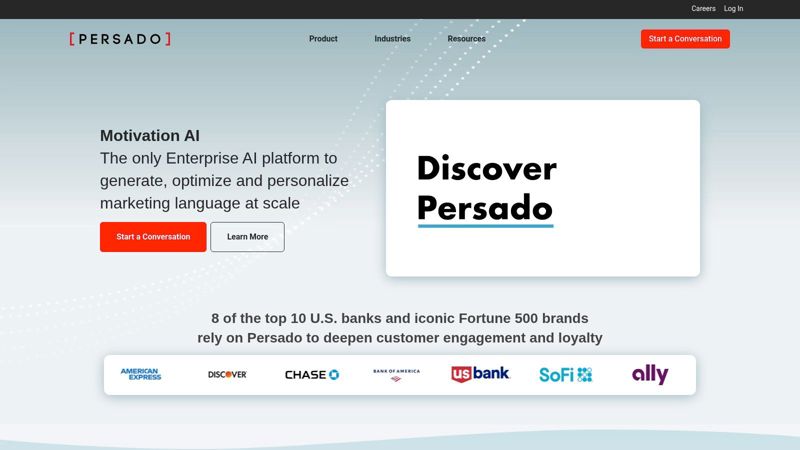
For example, imagine you're a real estate agent targeting both first-time homebuyers and experienced investors. Persado can analyze which language resonates best with each group, generating unique subject lines, body copy, and calls to action that speak directly to their motivations and concerns. For first-time buyers, it might focus on the excitement of owning a home and the security of a long-term investment. For experienced investors, it might emphasize potential ROI and market trends. This level of granular personalization is a game-changer for email marketing.
Persado's features include AI-generated personalized copy based on emotional response data, a comprehensive emotion taxonomy that identifies which emotional appeals work best for different segments, and multi-channel personalization across email, web, and ads. Its A/B testing framework allows for continuous refinement and optimization of messaging, ensuring that your email campaigns are always improving. Persado is particularly well-suited for enterprise-level organizations with large customer bases, offering the scalability and robust features necessary to manage complex personalization strategies. You can Learn more about Persado and its applications in personalized email marketing.
While Persado offers powerful capabilities, it's essential to consider the pros and cons. On the plus side, Persado generates truly unique content tailored to different audience segments, eliminating the guesswork from language selection. It consistently improves conversion rates through data-driven personalization and boasts enterprise-level capabilities for large organizations. However, Persado comes at a higher price point, making it more suitable for enterprise customers. It also requires some initial data to train the system effectively, and marketers have less direct control over specific wording compared to manual copywriting.
While pricing isn't publicly available, Persado is geared towards enterprise-level businesses, indicating a substantial investment. Implementation requires integration with your existing marketing technology stack and providing Persado with access to historical email data. This data allows the AI to learn your audience's preferences and generate effective personalized content.
Compared to simpler email personalization tools that rely on basic variable substitution, Persado offers a much more sophisticated and data-driven approach. It’s a powerful tool for email marketers, particularly within larger organizations, who want to move beyond basic personalization and leverage the power of AI to drive significant improvements in engagement and conversions. You can explore Persado's offerings further on their website: https://www.persado.com/. Persado earns its place on this list due to its unique AI-powered approach, focus on emotional resonance, and proven ability to deliver exceptional results for enterprise clients.
6. Braze
Braze stands out among email personalization tools for its ability to orchestrate sophisticated, cross-channel personalized experiences. More than just an email platform, Braze is a comprehensive customer engagement platform that unifies customer data from various sources to create a holistic view of each individual. This allows marketers to deliver consistent and relevant messaging across email, mobile push notifications, in-app messages, and even SMS, all tailored to individual preferences and behaviors. If you’re looking for a robust solution for true omnichannel personalization, Braze is a strong contender.
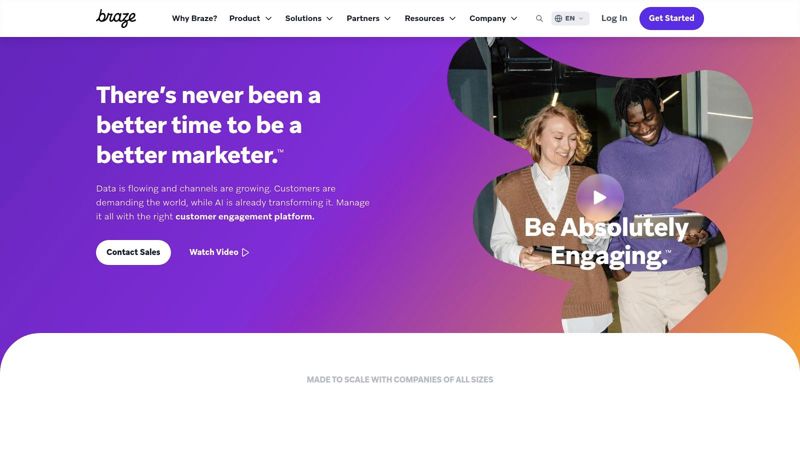
One of Braze's key strengths lies in its Canvas Flow feature. Imagine visually designing complex customer journeys where each step adapts based on real-time user interactions. That's precisely what Canvas allows you to do. For example, if a customer abandons a cart, Braze can trigger a personalized email reminder. If the email is unopened, a follow-up push notification can be sent, offering a discount code. This level of dynamic, cross-channel orchestration enables highly effective personalized campaigns. For email marketers specifically, Braze's Liquid templating language allows for dynamic content insertion, conditional logic, and loops, enabling the creation of truly unique and personalized emails at scale. Think targeted product recommendations based on past purchases, personalized subject lines that include the recipient's name or location, and customized email content based on user segments.
Braze excels with its Connected Content feature, enabling real-time personalization by pulling data from external APIs. Imagine integrating your inventory management system with Braze to display real-time product availability in your emails. Or, incorporating data from your CRM to personalize emails based on lead scoring or customer lifetime value. This powerful feature significantly enhances email relevance and boosts conversions. Moreover, Braze's predictive suite uses machine learning to determine optimal send times for each recipient, maximizing open and click-through rates. Content Blocks allows for the creation of modular, reusable personalized content components, streamlining the email creation process and ensuring consistency across campaigns.
While Braze offers powerful email personalization tools, it's essential to consider its enterprise-focused pricing structure, which may be prohibitive for smaller businesses. Furthermore, the platform has a steeper learning curve, especially when implementing advanced personalization features. Setting up and utilizing Braze effectively often requires dedicated technical resources.
Pros:
- Seamless cross-channel personalization capabilities.
- Real-time personalization based on user behavior.
- Enterprise-grade scalability.
- Strong machine learning capabilities for predictive personalization.
Cons:
- Enterprise-focused pricing that can be expensive.
- Steeper learning curve for implementing advanced personalization features.
- Implementation requires technical resources.
Website: https://www.braze.com/
Braze deserves a place on this list because it elevates email personalization beyond simple name and product recommendations. Its robust features and cross-channel capabilities allow marketers to create truly individualized experiences, fostering deeper customer engagement and ultimately driving better results. If your organization has the resources to invest in a powerful, enterprise-grade platform and is committed to sophisticated personalization strategies, Braze is worth considering.
7. Zeta Email
Zeta Email (formerly Trendline Interactive) stands out among email personalization tools for its enterprise-grade capabilities and focus on leveraging a 360-degree view of the customer. If you're looking to move beyond basic personalization and create truly dynamic, individualized email experiences, Zeta Email deserves a place in your toolkit. While it's not suited for every business, its advanced features make it a powerful option for larger organizations seeking sophisticated email personalization.
This email personalization tool goes beyond simply inserting a customer's name into an email. Zeta Email combines customer data from multiple sources, including its proprietary Zeta Data Cloud, to build a comprehensive understanding of each individual. This allows for personalization based not just on past behavior, but also on predicted future needs and interests. Imagine sending an email about a product a customer is likely to need before they even realize they need it – that's the power of Zeta Email.
Key Features and Benefits:
- Access to Zeta Data Cloud: This provides enhanced personalization signals beyond standard demographic data, allowing for more granular segmentation and targeting.
- Real-time Personalization: Zeta Email can react to a customer's current website activity, delivering personalized recommendations and offers in real-time. Think abandoned cart emails on steroids.
- AI-Driven Personalization: Leveraging artificial intelligence, the platform can predict future interests and needs, enabling proactive and highly relevant email campaigns.
- Journey Orchestration: Create personalized customer journeys across multiple touchpoints, including email, ensuring consistent messaging and a seamless brand experience.
- Identity Resolution: Maintain consistent personalization across devices, recognizing and consolidating customer data from different sources to provide a unified experience.
Practical Applications:
- E-commerce: Recommend products based on browsing history, predicted future purchases, and real-time website activity.
- Financial Services: Offer personalized financial advice, product recommendations, and account updates based on individual financial goals and circumstances.
- Travel and Hospitality: Deliver targeted travel deals, personalized itineraries, and relevant destination information based on past travel behavior and expressed interests.
Pros:
- Enterprise-Grade Personalization: Offers a level of sophistication unmatched by many other email personalization tools.
- Access to Proprietary Data: The Zeta Data Cloud provides a wealth of information for enhanced personalization.
- Advanced Identity Resolution: Ensures consistent personalization across all devices and touchpoints.
- Comprehensive Strategy and Services: Zeta offers more than just technology; they provide strategic guidance and services to help you maximize your email marketing efforts.
Cons:
- Enterprise Pricing Model: Zeta Email's pricing structure is geared towards larger businesses, making it less accessible for smaller companies. Contact Zeta directly for pricing details.
- Complex Implementation: Requires technical expertise to integrate and fully utilize the platform's features.
- Full Benefits Require Broader Zeta Platform: To truly unlock the full potential of Zeta Email, investment in the broader Zeta Marketing Platform may be necessary.
Implementation Tips:
- Plan Your Data Integration Strategy: Carefully consider how you will integrate your existing customer data with the Zeta platform.
- Define Clear Personalization Goals: Outline your specific objectives and how you will measure the success of your personalized email campaigns.
- Work with Zeta's Experts: Leverage Zeta's expertise to ensure proper implementation and ongoing optimization.
Comparison with Similar Tools:
While tools like Salesforce Marketing Cloud and Adobe Campaign offer robust email marketing capabilities, Zeta Email differentiates itself with its focus on real-time and predictive personalization powered by the Zeta Data Cloud. This makes it a particularly compelling option for businesses seeking to push the boundaries of email personalization.
Website: https://zetaglobal.com/
Zeta Email is a powerful email personalization tool that can help businesses create highly targeted and relevant email campaigns. While it's not the right fit for everyone, its advanced features and focus on predictive personalization make it a valuable asset for organizations looking to elevate their email marketing efforts.
8. Liveclicker: Real-Time Email Personalization for Up-to-the-Minute Relevance
Liveclicker stands out among email personalization tools by focusing on "moment-of-open" technology. Unlike traditional email personalization that locks in content at the time of send, Liveclicker dynamically updates email content at the very instant a recipient opens it. This allows for truly contextual experiences based on real-time factors like current time, location, weather, the device being used, and even up-to-the-minute inventory levels. Imagine sending an email promoting a flash sale where the discount code updates automatically based on the time remaining, or displaying location-specific store offers to each recipient. This dynamic approach keeps your emails perpetually relevant and engaging, regardless of when they are opened, significantly boosting the effectiveness of your email marketing campaigns.
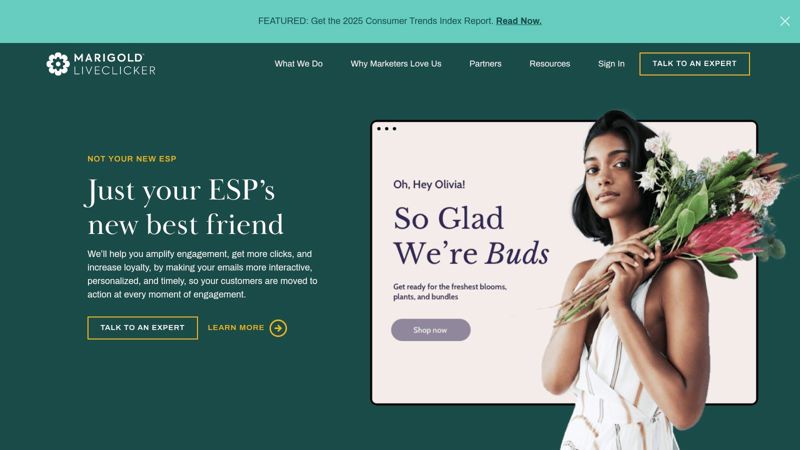
For time-sensitive promotions, Liveclicker's personalized countdown timers, synchronized to each recipient's timezone, create a sense of urgency and encourage immediate action. E-commerce businesses benefit from displaying live inventory updates and dynamic pricing within emails, preventing customer frustration from encountering out-of-stock items or outdated pricing. Location-based personalization, powered by geolocation data, allows you to tailor offers and content to each recipient's whereabouts, making your messages hyper-relevant. Moreover, Liveclicker optimizes email content for different devices, ensuring a seamless experience whether your recipients are on their desktops, smartphones, or tablets. This sophisticated level of real-time email personalization makes Liveclicker a powerful tool for marketers seeking to maximize engagement and conversions.
Liveclicker's ease of use is another significant advantage. Its intuitive interface requires no coding knowledge to implement even advanced personalization strategies, empowering marketers to create dynamic email experiences without relying on developers. The platform is also compatible with most major ESPs, streamlining integration into existing email workflows.
While Liveclicker excels at real-time personalization, it's important to note that its focus is primarily on moment-of-open dynamics rather than deep CRM integration. Its CRM capabilities are more limited compared to comprehensive marketing automation platforms. Furthermore, Liveclicker's premium pricing structure may be a consideration for budget-conscious users. However, for businesses prioritizing real-time, dynamic email personalization to drive engagement and conversions, the investment can be well justified.
Key Features & Benefits:
- Real-time, Moment-of-Open Personalization: Delivers truly dynamic content that updates at the moment of email open.
- Personalized Countdown Timers: Creates urgency and encourages immediate action with timezone-specific timers.
- Live Inventory & Pricing Updates: Displays up-to-the-minute product availability and pricing.
- Location-Based Personalization: Tailors content based on recipient geolocation.
- Device-Specific Optimization: Ensures a seamless experience across different devices.
- No Coding Required: Easy-to-use interface for implementing complex personalization strategies.
- ESP Compatibility: Integrates with most major email service providers.
Pros:
- Specialized in dynamic, real-time email personalization.
- No coding required for advanced implementations.
- Compatible with most major ESPs.
- Keeps emails perpetually relevant.
Cons:
- More focused on real-time elements than CRM-based personalization.
- Premium pricing.
- Limited CRM capabilities.
Website: https://www.liveclicker.com/
Liveclicker earns its spot on this list of top email personalization tools because it offers a unique and powerful approach to dynamic content delivery. By leveraging real-time data and moment-of-open technology, it enables marketers to create truly personalized email experiences that resonate with recipients and drive results. For businesses looking to elevate their email marketing beyond static content and achieve higher levels of engagement, Liveclicker is a valuable tool to consider.
9. Optimizely Email Recommendations
Optimizely Email Recommendations earns its spot on this list of top email personalization tools thanks to its robust AI-powered product recommendations tailored specifically for e-commerce businesses. If you're looking to significantly boost your email marketing ROI through highly personalized product suggestions, Optimizely offers a powerful solution, although it's geared towards mid-market and enterprise-level operations.
This sophisticated tool leverages machine learning algorithms to analyze individual customer behavior, including browsing history, past purchases, and product affinities. This allows you to move beyond generic email blasts and deliver truly individualized product recommendations directly to each subscriber's inbox. Imagine a customer recently browsed hiking boots on your website; Optimizely can automatically populate their next email with recommendations for related products like hiking socks, trekking poles, or waterproof jackets. This level of personalization drastically increases the relevance of your emails, leading to higher click-through rates and conversions.
For email marketers, Optimizely Email Recommendations offers a suite of powerful features:
- AI-Powered Product Recommendations: The core strength of this tool lies in its intelligent product recommendation engine. It automatically surfaces the most relevant products for each individual, eliminating the need for manual segmentation and guesswork.
- Cross-Channel Personalization: Optimizely goes beyond email by enabling consistent personalization across your website and other digital touchpoints. This creates a unified and seamless customer experience, reinforcing your brand message and fostering stronger customer relationships. This is particularly beneficial for social media managers and influencer marketers working on integrated campaigns.
- Automated Personalization through Machine Learning: The platform handles the heavy lifting by automating the personalization process. The machine learning algorithms continuously learn and improve over time, refining the accuracy of the recommendations and optimizing your email campaigns.
- A/B Testing Capabilities: Optimizely allows you to rigorously test different personalization strategies to determine what resonates best with your audience. This data-driven approach ensures you're always optimizing for maximum impact.
- Real-Time Behavioral Triggers: Send timely and relevant emails based on real-time customer behavior. For example, if a customer abandons their cart, Optimizely can trigger a personalized email reminding them of the items they left behind and offering a special incentive to complete the purchase. This feature is incredibly useful for sales teams looking to recover lost sales.
Pros:
- Advanced Product Recommendation Engine: Specifically designed for e-commerce, this engine excels at delivering highly relevant product suggestions.
- Integration with Optimizely's Broader Experimentation Platform: Seamless integration with other Optimizely products provides a comprehensive suite of tools for optimization and experimentation.
- Unified Customer Profiles: Ensures consistent and personalized experiences across all customer touchpoints.
- Automated Optimization: The platform continuously learns and improves over time, maximizing the effectiveness of your personalization efforts.
Cons:
- Higher Price Point: Optimizely is aimed at mid-market to enterprise customers, so it might not be the most budget-friendly option for smaller businesses or individual consultants and coaches. Pricing information isn't publicly available, requiring a direct consultation with Optimizely.
- Integration with Other Optimizely Products: While integration offers significant benefits, achieving the best results often requires using other Optimizely products, potentially increasing the overall cost and complexity.
- Implementation Requires Technical Resources: Setting up and configuring Optimizely Email Recommendations requires technical expertise.
Implementation Tips:
- Plan Your Integration Strategy: Before implementing, carefully consider how Optimizely will integrate with your existing marketing technology stack.
- Dedicate Technical Resources: Ensure you have the necessary technical expertise to handle the implementation and ongoing maintenance.
- Start with a Pilot Program: Begin with a small-scale pilot program to test and refine your personalization strategies before rolling them out to your entire audience.
Optimizely Email Recommendations provides a powerful solution for e-commerce businesses seeking advanced email personalization. While the higher price point and technical requirements might make it less suitable for smaller organizations, the platform’s robust features and sophisticated AI capabilities make it a valuable investment for those looking to maximize the impact of their email marketing efforts. You can explore more details and request a demo on their website: https://www.optimizely.com/products/intelligence/product-recommendations/
10. Bloomreach Engagement
Bloomreach Engagement (formerly Exponea) stands out as a robust email personalization tool, ideal for businesses seeking advanced capabilities beyond basic email marketing. This platform goes beyond simple merge tags, offering a sophisticated suite of features designed to deliver truly individualized email experiences. It achieves this by unifying all your customer data into a single, comprehensive view, allowing for hyper-segmented campaigns and real-time personalization based on individual behaviors. This makes it a particularly valuable email personalization tool for businesses focused on data-driven, customer-centric marketing strategies.

For example, imagine an e-commerce business using Bloomreach Engagement. A customer abandons their cart with a specific pair of shoes. Bloomreach, having access to their browsing history, past purchases, and real-time behavior, can trigger an email not just reminding them about the shoes, but also offering a personalized discount or suggesting complementary products like socks or shoe cleaner. This level of granular personalization dramatically increases the chances of conversion. Similarly, for event organizers, Bloomreach can personalize event invitations and follow-up emails based on attendee preferences and past event attendance, leading to higher engagement and ticket sales. Recruiters can utilize the platform to personalize outreach emails to potential candidates based on their skills and experience, significantly improving their response rates.
Bloomreach Engagement shines with its AI-driven features like product recommendations and next-best-offer predictions. These features allow marketers to automate personalized product suggestions and offers within emails, boosting cross-selling and upselling opportunities. The platform's visual customer journey designer makes it easy to map out and personalize each touchpoint in the customer lifecycle, ensuring consistent and relevant messaging across all email interactions. Compared to simpler email personalization tools that primarily focus on static segmentation and basic merge tags, Bloomreach provides a dynamic and evolving approach to personalization based on real-time data. Tools like Mailchimp or Constant Contact offer basic personalization, but lack the depth of Bloomreach's AI-driven insights and real-time capabilities.
While Bloomreach Engagement offers powerful email personalization tools, it’s important to consider its complexity and cost. This platform is geared towards enterprise-level businesses and comes with an enterprise pricing model, making it less accessible to smaller businesses with limited budgets. Implementation requires technical resources and a steeper learning curve to fully utilize its potential. Setup involves integrating your various data sources into Bloomreach's unified data model, requiring careful planning and execution. However, for businesses that prioritize advanced email personalization and have the resources to invest in a comprehensive platform, Bloomreach Engagement offers a significant competitive advantage.
Features:
- Single customer view unifying all data for comprehensive personalization
- AI-powered product recommendations and next-best-offers
- Hyper-segmentation with automated audience management
- Real-time personalization based on current session behavior
- Visual customer journey designer with personalization at each touchpoint
Pros:
- All-in-one platform combining CDP capabilities with email personalization
- Real-time personalization capabilities across channels
- Sophisticated AI capabilities for advanced personalization
- Unified data model for consistent personalization
Cons:
- Enterprise pricing model beyond reach of smaller businesses
- Complex implementation requiring technical resources
- Steep learning curve to utilize full personalization potential
Website: https://www.bloomreach.com/en/products/engagement
Top 10 Email Personalization Tools: Head-to-Head Comparison
| Platform | Core Features ✨ | User Experience ★ | Target Audience 👥 | Pricing/Value 💰 |
|---|---|---|---|---|
| 🏆 OKZest | No-code/API automation, dynamic & static data, merge tags | Intuitive & responsive; robust real-time support | Marketers, coaches, agencies, enterprises | Scalable: Free to enterprise plans |
| Mailchimp | Dynamic content blocks, behavior automation, segmentation | User-friendly; strong analytics | Beginners, SMBs, general marketers | Free tier available; pricing rises with scale |
| HubSpot Email | CRM-powered personalization, smart content, A/B testing | Integrated interface; some features require learning | Marketing teams, enterprises | Premium pricing with robust CRM synergy |
| Klaviyo | E-commerce sync, dynamic recommendations, predictive insights | Deep integrations; effective segmentation | E-commerce businesses | Premium cost; high ROI for online stores |
| Persado | AI-generated copy, emotion-driven personalization, A/B testing | Data-driven; delivers optimized engagement | Large enterprises, advanced brands | Enterprise pricing for data-backed results |
| Braze | Cross-channel personalization, real-time API integration, Liquid templating | Scalable; powerful but technically complex | Advanced marketing teams, enterprises | Higher price point for comprehensive features |
| Zeta Email | 360° customer view, real-time data integration, AI personalization | Enterprise-grade; complex setup | Large enterprises, global brands | Enterprise pricing with extensive data capabilities |
| Liveclicker | Moment-of-open personalization, dynamic timers, geolocation | No-code setup; delivers real-time updates | Marketers needing timely, contextual updates | Premium pricing for niche real-time features |
| Optimizely Email | AI-driven product recommendations, automated campaigns | Unified profiles; optimized for e-commerce | Mid-market to enterprises, e-commerce brands | Higher tier; best with integrated experimentation |
| Bloomreach Engagement | Unified CDP, AI-powered automation, customer journey mapping | Comprehensive; requires investment & learning | Enterprise-level marketers, global brands | Enterprise pricing for all-in-one personalization |
Choosing the Right Email Personalization Tool
Finding the perfect email personalization tool from the options discussed—including OKZest, Mailchimp, HubSpot, Klaviyo, Persado, Braze, Zeta Email, Liveclicker, Optimizely, and Bloomreach—is crucial for maximizing your email marketing ROI. The best choice depends on a variety of factors. Consider your budget: some tools offer free plans for basic needs, while others cater to enterprise-level budgets. Your business size matters too, as some platforms are better equipped for scaling alongside growth. The complexity of your email marketing strategy, and the technical expertise within your team, should also inform your decision. Think about whether you need a standalone email marketing platform or one that integrates with your existing CRM or marketing automation tools.
Key takeaways include understanding the power of segmentation, the importance of dynamic content, and the potential of AI-powered personalization to drive conversions. Personalization can also be enhanced by using dynamic content in your emails, which tailors the message to each individual subscriber based on their behavior, preferences, or other data. This approach, as outlined in Dynamic Content in Email Marketing That Converts from Checkout Links, can significantly boost engagement and conversions. By carefully considering your requirements and exploring the diverse range of email personalization tools available, you can select the solution that best aligns with your goals and sets you up for success in 2025 and beyond. Remember, effective personalization goes beyond simply inserting names; leveraging features like dynamic content, behavioral targeting, and A/B testing are key to creating truly resonant email experiences.
Ready to elevate your email personalization strategy? Explore OKZest, a powerful tool designed to help you craft highly personalized email campaigns that resonate with your audience and drive results. Visit OKZest today and discover how easy it can be to create impactful, personalized emails.